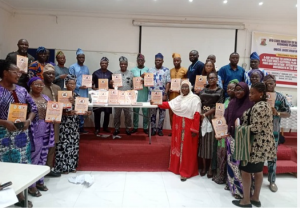The Oyo State Government, in collaboration with UNICEF, has launched a four-year Multi-Sectoral Strategic Plan of Action on Food and Nutrition (OYSMPFAN) to combat malnutrition and hunger among children and women. The initiative, which aligns with global and national nutrition strategies, aims to address food security challenges across households, communities, and local governments in the state.
During the official launch in Ibadan, the Commissioner for Budget and Economic Planning, Prof. Misbaudeen Babatunde, emphasized the government’s unwavering commitment to eradicating malnutrition. Represented by his executive assistant on finance, budget, and economic planning, Gafar Bello, he explained that the policy would serve as a guiding framework for improving nutrition at all levels of society. The commissioner stressed that poor nutrition is a significant barrier to child development, education, and economic productivity, making urgent intervention necessary.
As part of its commitment to ensuring the program’s success, the Oyo State Government has allocated ₦350 million to nutrition-focused initiatives. This includes ₦250 million as a counterpart fund for the Accelerating Nutrition Results in Nigeria (ANRIN) project, a World Bank-backed initiative aimed at improving maternal and child nutrition, which began in March 2020. Additionally, ₦100 million has been committed to the Basic Health Care Provision Fund project, which focuses on strengthening healthcare services for vulnerable groups.
Babatunde expressed appreciation for UNICEF’s continuous contributions to child and maternal welfare in Oyo State. He noted that the strategic plan is expected to significantly reduce malnutrition rates, particularly stunted growth among children, which remains a pressing issue. He also highlighted the broader economic benefits of investing in nutrition, pointing out that a well-nourished population translates to a more productive workforce and reduced healthcare costs in the long run.
Beyond the immediate goals of addressing hunger and malnutrition, the initiative forms part of the state’s long-term vision for sustainable development. Babatunde announced that the government had developed a 20-year strategic plan, Agenda 2040, which incorporates various policies aimed at fostering economic growth, employment, and an improved standard of living. He assured stakeholders that the administration is working tirelessly to create an environment where women and children have access to the resources they need to thrive.
UNICEF representative Boluwatife Ogunjimi provided key insights into the scale of the malnutrition crisis in Oyo State, revealing that the stunted growth rate among children currently stands at approximately 34.5%. She emphasized that malnutrition is one of the leading contributors to child mortality, underscoring the importance of good nutrition in reducing preventable deaths. Ogunjimi reiterated UNICEF’s commitment to supporting the government’s efforts in tackling this challenge, particularly through initiatives that promote exclusive breastfeeding, micronutrient supplementation, and access to diverse, nutritious foods.










